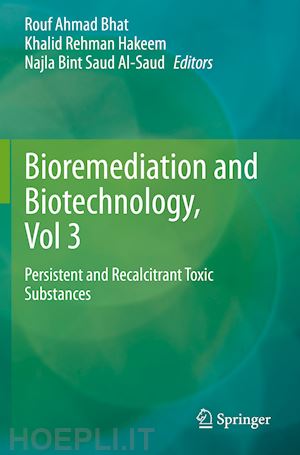

Questo prodotto usufruisce delle SPEDIZIONI GRATIS
selezionando l'opzione Corriere Veloce in fase di ordine.
Pagabile anche con Carta della cultura giovani e del merito, 18App Bonus Cultura e Carta del Docente
Dr. Khalid Rehman Hakeem (PhD) is Professor at King Abdulaziz University, Jeddah, Saudi Arabia. After completing his doctorate (Botany; specialization in Plant Eco-physiology and Molecular Biology) from Jamia Hamdard, New Delhi, India, in 2011, he worked as a lecturer at the University of Kashmir, Srinagar, for a short period. Later, he joined Universiti Putra Malaysia, Selangor, Malaysia, and worked there as Postdoctorate Fellow in 2012 and Fellow Researcher (Associate Professor) from 2013 to 2016. Dr. Hakeem has more than 10 years of teaching and research experience in plant eco-physiology, biotechnology and molecular biology, medicinal plant research, plant-microbe-soil interactions as well as in environmental studies. He is the recipient of several fellowships at both national and international levels; also, he has served as the visiting scientist at Jinan University, Guangzhou, China. Currently, he is involved with a number of international research projectswith different government organizations. So far, Dr. Hakeem has authored and edited more than 50 books with international publishers, including Springer Nature, Academic Press (Elsevier), and CRC Press. He also has to his credit more than 100 research publications in peer-reviewed international journals and 60 book chapters in edited volumes with international publishers. At present, Dr. Hakeem serves as an editorial board member and reviewer of several high-impact international scientific journals from Elsevier, Springer Nature, Taylor and Francis, Cambridge, and John Wiley Publishers. He is included in the advisory board of Cambridge Scholars Publishing, UK. He is also a fellow of Plantae group of the American Society of Plant Biologists, member of the World Academy of Sciences, member of the International Society for Development and Sustainability, Japan, and member of Asian Federation of Biotechnology, Korea. Dr. Hakeem has been listed in Marquis Who’s Who in the World, since 2014–2019. Currently, Dr. Hakeem is engaged in studying the plant processes at eco-physiological as well as molecular levels.
Dr Rouf Ahmad Bhat is working in Cluster University Srinagar (J&K), India on the capacity of Assistant Professor and has his specialization in Limnology, Toxicology, Phytochemistry, and Phytoremediation. He has been teaching graduate and postgraduate students of Environmental Sciences for the past 3 years. He is an author of more than 50 research papers and 25 book chapters and has published more than 10 books with international publishers. He has presented and participated in numerous state, national, and international conferences, seminars, workshops, and symposiums. He has worked as an associate Environmental Expert in World Bank funded Flood Recovery Project and also an Environmental Support Staff in Asian Development Bank (ADB) funded development projects. He has received many awards, appreciations, and recognitions for his services tothe science of water testing, air, and noise analysis. He has served as editorial board member and reviewer of reputed international journals. He is still writing and experimenting with diverse capacities of plants for use in aquatic pollution.
Dr Najla Bint Saud Al-Saud (PhD) is Associate Professor in Genetics and Biotechnology. She is the Director of the Princess Dr Najla Bint Saud Al-Saud center for Excellence Research in Biotechnology, King Abdulaziz University, Jeddah, Saudi Arabia.











Il sito utilizza cookie ed altri strumenti di tracciamento che raccolgono informazioni dal dispositivo dell’utente. Oltre ai cookie tecnici ed analitici aggregati, strettamente necessari per il funzionamento di questo sito web, previo consenso dell’utente possono essere installati cookie di profilazione e marketing e cookie dei social media. Cliccando su “Accetto tutti i cookie” saranno attivate tutte le categorie di cookie. Per accettare solo deterninate categorie di cookie, cliccare invece su “Impostazioni cookie”. Chiudendo il banner o continuando a navigare saranno installati solo cookie tecnici. Per maggiori dettagli, consultare la Cookie Policy.